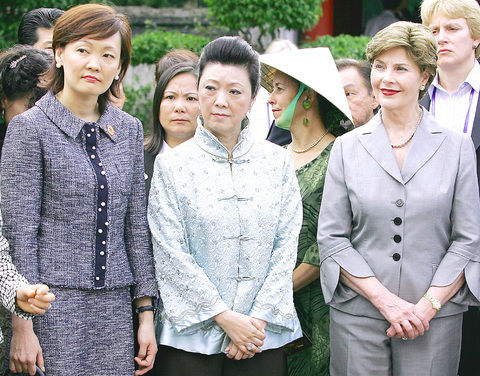At the APEC summit meeting yesterday, international leaders expressed support for the resumption of the Doha Development Agenda and stressed the importance of setting up measures to facilitate the negotiation of bilateral and regional free trade agreements.
They also unanimously agreed that the Free-Trade Area of the Asia-Pacific (FTAAP) initiative should be advanced. The initiative was originally not supported by several member economies.
Taiwan's APEC envoy Morris Chang (張忠謀) briefed Taiwanese reporters yesterday at a press conference after the meeting concluded.

PHOTO: AP
Chang sat between Singaporean Prime Minister Lee Hsien Loong and Thai Prime Minister Surayut Chulano during the meeting held in Hanoi.
Chang discussed his exchanges with US President George W. Bush and Chinese President Hu Jintao (
When yesterday's summit finished, Bush walked Chang out of the conference room while the two had short talks, Chang said.
Chang also had an exchange with Hu while other leaders were waiting to leave the conference room.
Chang said Hu was friendly and courteous, but stressed that it was impossible to talk about serious topics with Hu or Bush in such short time periods.
Chang declined to answer questions on whether President Chen Shui-bian (陳水扁) had asked him to pass a message on to Bush about Taiwan's arms procurement plans.
Earlier in the day, the spouses of the APEC representatives paid a visit to the Temple of Literature in Hanoi, an ancient Vietnamese structure that was built in 1070 while the leaders held their close-door meeting in the National Conference Center.
During the tour of the historical site, Sophie Chang (
The group appeared to be having a friendly exchange while listening to a guide describe the temple's history.
The spouses were shown some traditional Vietnamese silk embroidery in the temple and Sophie Chang discussed several of the art works with other leaders' wives.
Both Sophie Chang and Laura Bush's daughters are members of the First Book New York City Advisory Board, Sophie Chang said in a press conference yesterday afternoon.
Sophie Change said the two had many common points of interest to talk about during the tour. Sophie Chang showed Laura Bush an email written by her daughter and Laura wrote “with thanks to First Book” on it as a gift to Chang's daughter.
First Book is a project that Laura Bush is promoting in the US, which aims to give children from low-income families the opportunity to read and own brand new books.

EUROPEAN TARGETS: The planned Munich center would support TSMC’s European customers to design high-performance, energy-efficient chips, an executive said Taiwan Semiconductor Manufacturing Co (TSMC, 台積電), the world’s largest contract chipmaker, yesterday said that it plans to launch a new research-and-development (R&D) center in Munich, Germany, next quarter to assist customers with chip design. TSMC Europe president Paul de Bot made the announcement during a technology symposium in Amsterdam on Tuesday, the chipmaker said. The new Munich center would be the firm’s first chip designing center in Europe, it said. The chipmaker has set up a major R&D center at its base of operations in Hsinchu and plans to create a new one in the US to provide services for major US customers,

The Ministry of Transportation and Communications yesterday said that it would redesign the written portion of the driver’s license exam to make it more rigorous. “We hope that the exam can assess drivers’ understanding of traffic rules, particularly those who take the driver’s license test for the first time. In the past, drivers only needed to cram a book of test questions to pass the written exam,” Minister of Transportation and Communications Chen Shih-kai (陳世凱) told a news conference at the Taoyuan Motor Vehicle Office. “In the future, they would not be able to pass the test unless they study traffic regulations

GAINING STEAM: The scheme initially failed to gather much attention, with only 188 cards issued in its first year, but gained popularity amid the COVID-19 pandemic Applications for the Employment Gold Card have increased in the past few years, with the card having been issued to a total of 13,191 people from 101 countries since its introduction in 2018, the National Development Council (NDC) said yesterday. Those who have received the card have included celebrities, such as former NBA star Dwight Howard and Australian-South Korean cheerleader Dahye Lee, the NDC said. The four-in-one Employment Gold Card combines a work permit, resident visa, Alien Resident Certificate (ARC) and re-entry permit. It was first introduced in February 2018 through the Act Governing Recruitment and Employment of Foreign Professionals (外國專業人才延攬及雇用法),

‘A SURVIVAL QUESTION’: US officials have been urging the opposition KMT and TPP not to block defense spending, especially the special defense budget, an official said The US plans to ramp up weapons sales to Taiwan to a level exceeding US President Donald Trump’s first term as part of an effort to deter China as it intensifies military pressure on the nation, two US officials said on condition of anonymity. If US arms sales do accelerate, it could ease worries about the extent of Trump’s commitment to Taiwan. It would also add new friction to the tense US-China relationship. The officials said they expect US approvals for weapons sales to Taiwan over the next four years to surpass those in Trump’s first term, with one of them saying